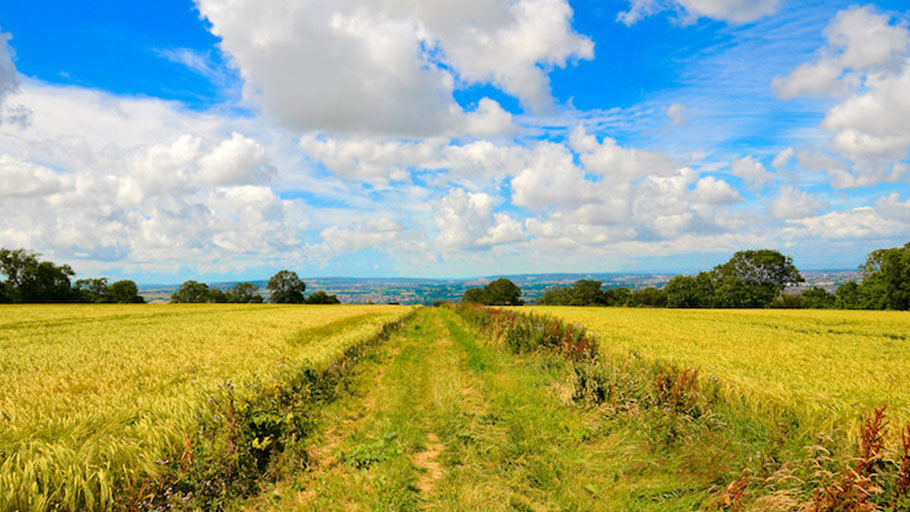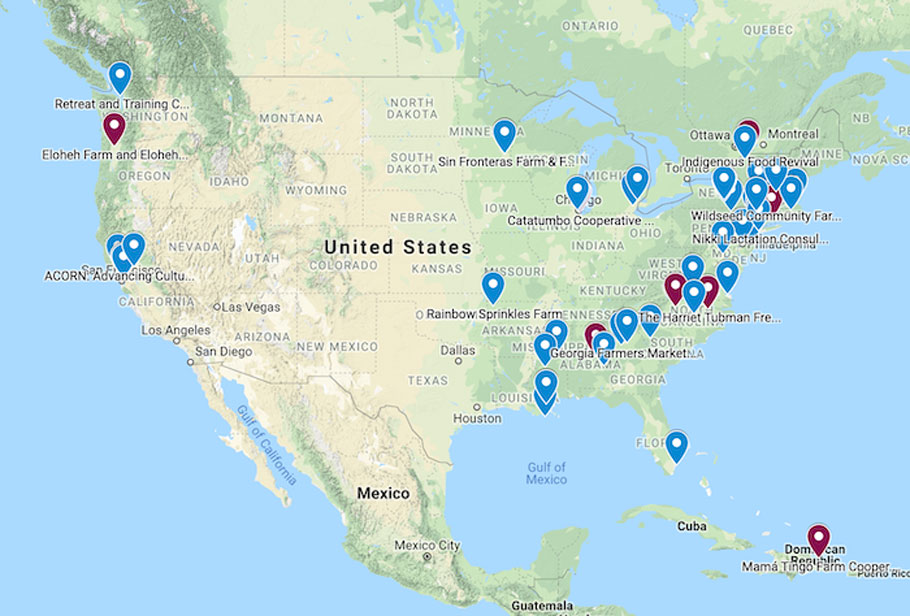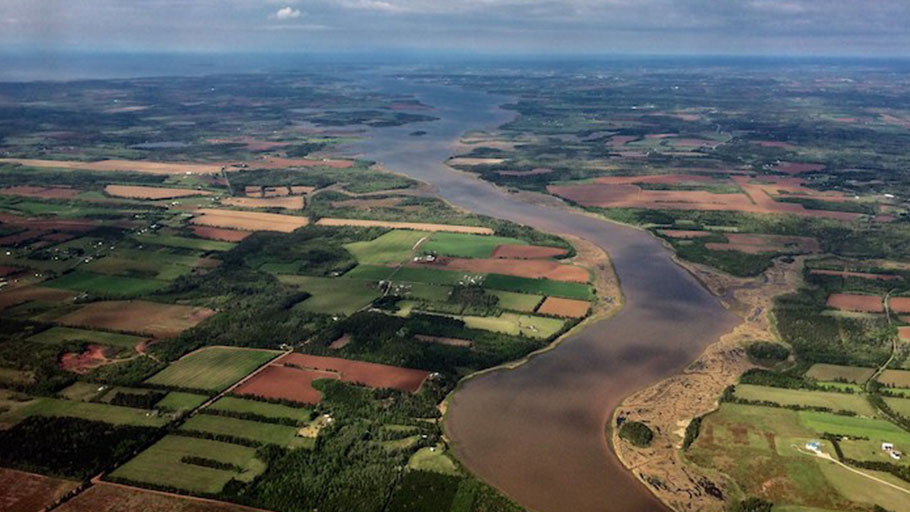“Reparations are a framework for transformation, allowing people to do tomorrow what cannot be done today.” –Ed Whitfield, author and co-managing director of the Fund for Democratic Communities
By Douglass DeCandia, Center for Humans and Nature —
I am a person of European descent living on occupied Leni Lenape territory, in the so-called Hudson Valley of New York State. For thirty-three years, I have moved through this world as a white, cisgender, masculine-presenting, able-bodied, Christian-orientated person with class privilege. I have received the many “handouts” that come with each of these identities, as well as some of the many internalized superiority complexes. I understand these identities as constructs through which power gets distributed, and I am continually trying to better understand how these identities both are and are not reflective of who I truly am. Part of this involves understanding some of the many ways that I, and my family, continue to benefit from the long history of settler colonialism and white supremacy in this country.
My relatives were able to accumulate and pass down wealth through the generations in part because of laws that have been set to keep power in the hands of white people and to make sure divisions remained among the races and classes of America. My relatives were allowed to own property and vote at a time when these rights were denied to Black and Indigenous people. My relatives received the benefits of the GI Bill and the Social Security Act, which excluded groups of domestic and agricultural workers—of whom a large percentage, at the time of the New Deal in the 1930s, were African American. My relatives have not been the targets of the systematic discrimination of redlining, nor have we been pushed out of our homes by gentrification.
My family has been supported and protected by racist laws and institutions over the centuries; I continue to receive the inheritances of this legacy. In addition to money that was left to me by my grandparents, I inherited access to many social support networks that helped me find jobs when I needed work. As I continue to learn about my family and how we fit into the history of this country, I understand more deeply that the money I have inherited and the money I have been paid is not my own, but has been allowed to me through centuries of extraction (from the land and from people who are not considered white) and accumulation (into the hands of those considered white). Reparations are much more than giving money; they are a re-distribution of energy that has been generated through a disparity of power.
Though I have benefited from the systems of white supremacy and patriarchy in material ways, I know they have also caused deep harm—influencing physical, emotional, and spiritual dis-ease within myself, within others, and within the Earth. The following essay is a small offering toward a healing of this dis-ease and the building of a more just and beautiful world.
This essay is primary focused on the importance of reparations in this work. In it is guidance for what reparations are and how they can be realized today, gathered from frontline organizations of the Black, Indigenous, and People of Color (BIPOC) communities leading this movement for transformation.
Why Reparations
I support reparations because my life, my children’s lives, and the lives of everyone on this planet depend on it.
During the last five hundred years, colonization has spread across this continent like a sickness.[1] It has brought with it ideologies of duality, exploitation, and war that have seeped into the core of how we, as people, relate to each other and to the land. These ideologies have become the oppressive systems and institutions that surround us, none of which existed on Turtle Island prior to European conquest.[2]
White supremacy and capitalism are colonial imports that are historically and systematically linked together in this country from its founding.[3] This begins with land. Land is the foundation of wealth, and to profit from land (rather than sustain with and upon it) requires the extraction of “natural resources” (e.g., theft and “development” of indigenous lands, mining, industrialized agriculture, and the like). Extraction necessitates the exploitation of a racialized group, or groups, of people (e.g., enslaved Africans, indentured Europeans, “criminals,” immigrants, poor, and working classes) to do the work. Under this system of racial capitalism, land and wealth has been extracted from Black, Indigenous, and Communities of Color to be concentrated into the hands of white settlers.
Concentration in itself implies an imbalance, and this imbalance can be followed across the last five centuries and seen today manifesting in ways that indicate things are not well. As land has come, through force and coercion, under the control of white people through systematic privatization, the Earth and its inhabitants have begun a massive process of degradation and collapse: The great prairie has been upturned and buffalo forced into extinction. Some of the world’s oldest forests have become clear cuts overnight. Waters have become polluted. In the northwest, where salmon was once so abundant, their numbers now dwindle as dams built by logging companies block their yearly journey upstream to spawn. Mountaintops continue to be blown off with total disregard for anything other than profit. People have been forced, from self-reliant life ways, into becoming “consumers,” and millions are dying now from illnesses related to malnourishment. Cities continue to expand. Entire communities (human and other-than-human) dismembered.
All this has been part of the building of the settler colonial American Empire—something that has thrown human and ecological systems out of balance and leaves us all in a moment of collective peril. Because all lives, countries, and systems are inter-connected, the extraction and concentration that has occurred on the North American continent has influenced great changes across the entire planet. Climate crisis and the diminishment of vital resources are expressions of a deep imbalance, which, in this moment, threatens our collective future.
Things, as they are right now and have been for a while, are not working. To reverse climate change and heal the many wounds caused by colonization and war requires a transformation in how we, as people, relate to each other and to the land. Reparations and the return of Indigenous lands are not separate from this, nor are they an idealistic pipe dream, for the sovereignty and self-determination of BIPOC individuals and communities are a part of this much-needed transformation. Reparations and the return of Indigenous lands are essential to any possibility for human survival and life lived in right relationship with each other and the natural world.
What Reparations Are
What reparations are and what they are not must be determined by those most directly impacted by white supremacy and settler colonialism. It is not up to those who have benefited from these systems and institutions of oppression (white people, and most specifically white, cis-gendered, able-bodied, Christian-oriented, men with class privilege) to determine what reparations are or how resources and land (i.e., wealth, power, energy) should be re-distributed. BIPOC individuals and communities have been organizing for sovereignty and self-determination for centuries, and it is under their leadership that today’s movement must follow.
With that said, here are excerpts directly from the Reparation Toolkit, compiled by the Movement for Black Lives.[4]
 The Reparations Toolkit
The Reparations Toolkit
(The text below is quoted directly from the Reparations Toolkit.[4])
What Is Reparations?
Reparations is the act or process of making amends for a wrong.
The National Coalition of Blacks for Reparations in America (N’COBRA) Defines Reparations as: A process of repairing, healing, and restoring a people injured because of their group identity and in violation of their fundamental human rights by governments, corporations, institutions, and families. Those groups that have been injured have the right to obtain from the government, corporation, institution, or family responsible for the injuries that which they need to repair and heal themselves. In addition to being a demand for justice, it is a principle of international human rights law.
The United Nations outlines five conditions that must be met for full reparations full reparations:
1) Cessation, Assurances, and Guarantees of Non-Repetition: Under international law, a state responsible for wrongfully injuring a people “is under an obligation to a) “cease the act if it is continuing, and, b) offer appropriate assurances and guarantees of non-repetition…”
2) Restitution and Repatriation: Restitution means to “re-establish the situation which existed before the wrongful act was committed.” Changes traced to the wrongful act are reversed through restoration of freedom, recognition of humanity, identity, culture, repatriation, livelihood, citizenship, legal standing, and wealth to the extent they can be, and if they cannot, restitution is completed by compensation.
3) Compensation: The injuring state, institution, or individual is obligated to compensate for the damage, if damage is not made good by restitution.
4) Satisfaction: Satisfaction is part of full reparations under international law for moral damage, such as “emotional injury, mental suffering, and injury to reputation.” In some instances where cessation, restitution, and compensation do not bring full repair, satisfaction is also needed. Apology falls under the reparative category of satisfaction.
5) Rehabilitation: Rehabilitation shall be provided to include legal, medical, psychological, and other care and services.
It is reparations if it includes (Movement for Black Lives):
- An official acknowledgment and apology for harm, public education, or memorial about the harm; and
- Compensation to a specific, defined group of individuals harmed by a violation, including descendants, as well as family and community members of individuals directly targeted for harm who were adversely affected; and
- Action to restore individuals harmed to the position they were in before the initial harm occurred; and
- Action to stop the systems, institutions, and practices causing the harm; and
- Changes to laws, institutions, and systems aimed at ensuring that harm will not happen again
What Reparations Is [sic] Not
Reparations is a concept rooted in international law that involves specific forms of repair to specific individuals, groups of people, or nations for specific harms they have experienced in violation of their human rights. Therefore, reparations cannot be achieved simply through “acknowledgment or an apology” or “investment in underprivileged communities.”
Reparations is not:
- Just saying sorry or feeling bad while avoiding accountability for individual or collective contributions to the violation, or while benefiting from the harm, whether through inheritance or ongoing privileges
- Paying an individual Black person’s bills
- Donating any amount of money to a Black institution, unless accompanied by acts of repair, restitution, and efforts to leverage power, influence, and resources to ensure cessation and non-repetition, simply writing a check is not reparations
How to Support Reparations and Rematriation
Toward supporting reparations and the return of indigenous land and resources I would encourage folx to connect directly with BIPOC-led organizations in their region that are working toward repair and restoration.[5] The Reparations Toolkit is an amazing resource into how reparations can look, and includes case studies on campaigns that “have sought reparations for specific harms to Black people or disproportionately experienced by Black people in the United States.”
In addition to actions toward reparation that can be taken on legislative, judicial, and administrative levels (e.g., supporting current congressional Bill H.R. 40, returning indigenous lands taken by the US government), there are also powerful ways that can be enacted on a person-to-person level. Below is an example of people-based platforms that support the repair and return of land, wealth, and dignity to the people and communities it has been stolen from.[6]
Reparations Map for Black-Indigenous Farmers
The Reparations Map for Black-Indigenous Farmers, co-created by Soul Fire Farm and the Northeast Farmers of Color Network, is an online database of BIPOC-led land-based projects across the continent. The platform supports reparations and people-to-people solidarity. Projects are listed on the map with descriptions of resources (land, farm equipment, funding, etc.) necessary for the farmers/organizers to manifest the project. People (those who have benefited from the long history of colonialism, white supremacy, patriarchy and/or wealth concentration) with access to resources have the capacity to learn about a project on the map, connect with the organizers directly, and give reparations.
 Last February, when the map was first made public, I was reading through the different projects and came upon one lead by somebody I connected with the past winter at a conference for young farmers. At the conference I learned a lot from them, not just about their personal desire to begin a farm but also about how the legacy of dispossession (due to the past and ongoing harms of slavery) has impacted their, and many people of color’s, ability to access land and the liberation that comes through being self-determined on land. On the map, I read about what they needed to manifest their dream, and so I was able to move resources to them in support of this. They and I have further built a relationship with each other, and, I feel, a deeper understanding of how all lives are bound together.
Last February, when the map was first made public, I was reading through the different projects and came upon one lead by somebody I connected with the past winter at a conference for young farmers. At the conference I learned a lot from them, not just about their personal desire to begin a farm but also about how the legacy of dispossession (due to the past and ongoing harms of slavery) has impacted their, and many people of color’s, ability to access land and the liberation that comes through being self-determined on land. On the map, I read about what they needed to manifest their dream, and so I was able to move resources to them in support of this. They and I have further built a relationship with each other, and, I feel, a deeper understanding of how all lives are bound together.
More information about the map can be found on Soul Fire Farm’s website.[7]
As a white person of colonizer descent who believes a more just and beautiful world is possible, I know that I must authentically listen and act with accountability to BIPOC individuals and communities organizing for reparations and land rematriation. I also understand that I must take on the deep personal work of undoing the superiority complexes that I have been subjected to due to my positionality. I am guided in all of this by ideas of collective liberation. In the words of Dr. Maya Angelou, “No one of us can be free until everybody is free.” When we move away from domination by supporting and uplifting those who have been most impacted by the worst of it, we are able to move toward equity. Where there is equity there is balance, and where there is balance all life flourishes.
Notes
- Colonialism, like the harms of slavery and genocide, are not strictly of the past, but are ongoing.
- Turtle Island is a name used by Indigenous Peoples to describe the land now referred to as North America.
- See Robin D.G. Kelly’s work “What is Racial Capitalism and Why Does it Matter” at http://scholarsforsocialjustice.com/what-is-racial-capitalism-and-why-does-it-matter/ , as well as Jacqueline Battalora’s book Birth of a White Nation.
- Ritchie, A., Smith, D., Johnson, J., Ifetayo, J., Stahly-Butts, M., Kaba, M., … Obuya, T. The Reparations Now Toolkit. Pgs 22-25. Accessed athttps://policy.m4bl.org/downloads/.
- “Rematriation refers to reclaiming of ancestral remains, spirituality, culture, knowledge, and resources, instead of the more Patriarchally associated Repatriation.” (Bernedette Muthien, http://www.gift-economy.com/articlesAndEssays/rematriation.pdf)
- H.R. 40 – Commission to Study and Develop Reparation Proposals for African-Americans Act. “This bill establishes the Commission to Study and Develop Reparation Proposals for African-Americans. The commission shall examine slavery and discrimination in the colonies and the United States from 1619 to the present and recommend appropriate remedies. Among other requirements, the commission shall identify (1) the role of federal and state governments in supporting the institution of slavery, (2) forms of discrimination in the public and private sectors against freed slaves and their descendants, and (3) lingering negative effects of slavery on living African-Americans and society (Congress.gov).”
- Reparations Map for Black-Indigenous Farmers. http://www.soulfirefarm.org/get-involved/reparations/.















